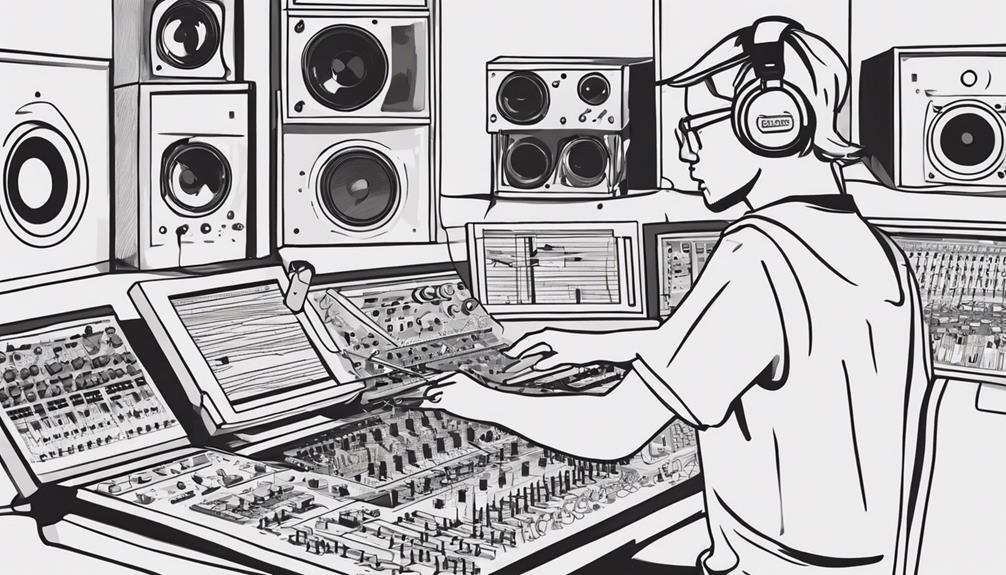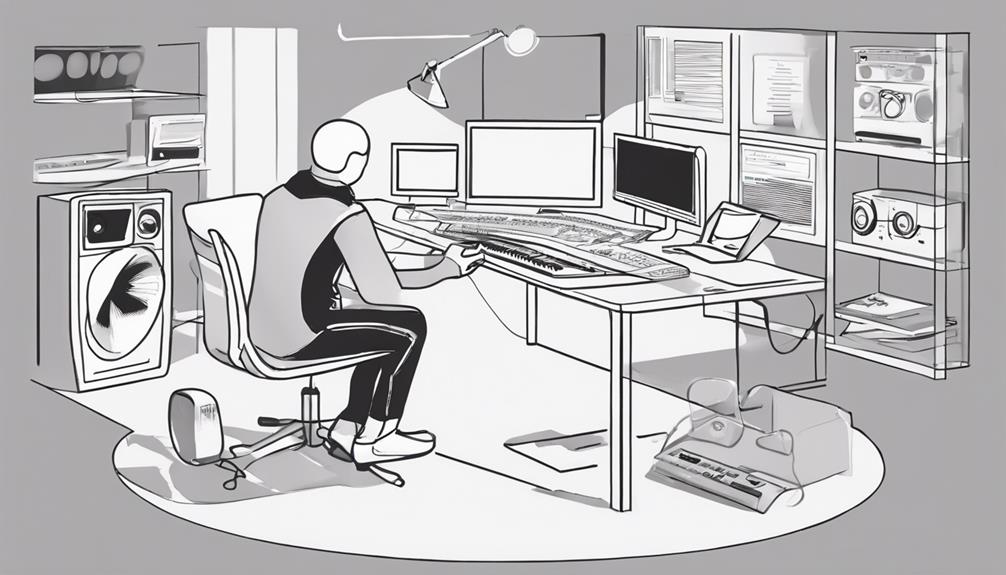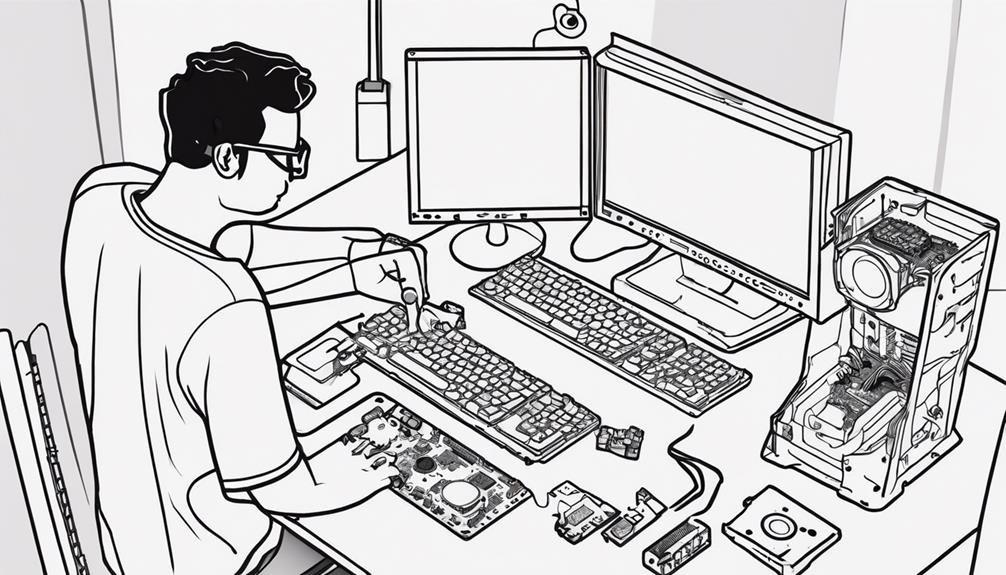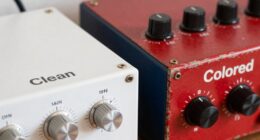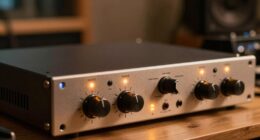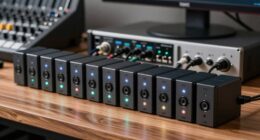To begin your music production career, start by choosing software that fits your style. Get quality gear like a computer and studio headphones. Boost skills through online courses and collaborations. Showcase work on social media to grow your online presence. Partner with fellow musicians for experience and networking. Start strong, and the journey into music production will unfold before you, showing you exciting opportunities in a dynamic industry.
Key Takeaways
- Research music production software and choose one that fits your style.
- Invest in quality equipment like a computer, audio interface, and headphones.
- Take online courses and collaborate with musicians to enhance skills.
- Showcase work on social media to build an online presence.
- Collaborate with aspiring musicians to gain practical experience and expand your network.
Music Production Career Overview
If you're considering a career in music production, you'll be diving into a dynamic world where creativity meets technical expertise. Successful music producers in the industry have a deep understanding of the recording process and work closely with artists to bring their vision to life.
Recording in a DAW (Digital Audio Workstation) is a key aspect of a music production career, where producers oversee sessions to guarantee a cohesive final product.
In the music industry, successful producers often have a strong network, collaborating with various professionals to stay updated on industry trends. This career path offers opportunities for growth and creativity while allowing you to make a lasting impact on the music industry.
To thrive in this field, it's essential to develop technical proficiency, foster creativity, communicate effectively, and understand the intricacies of the recording process. Embracing these skills will set you on a path towards a fulfilling and rewarding career in music production.
Essential Skills for Music Producers
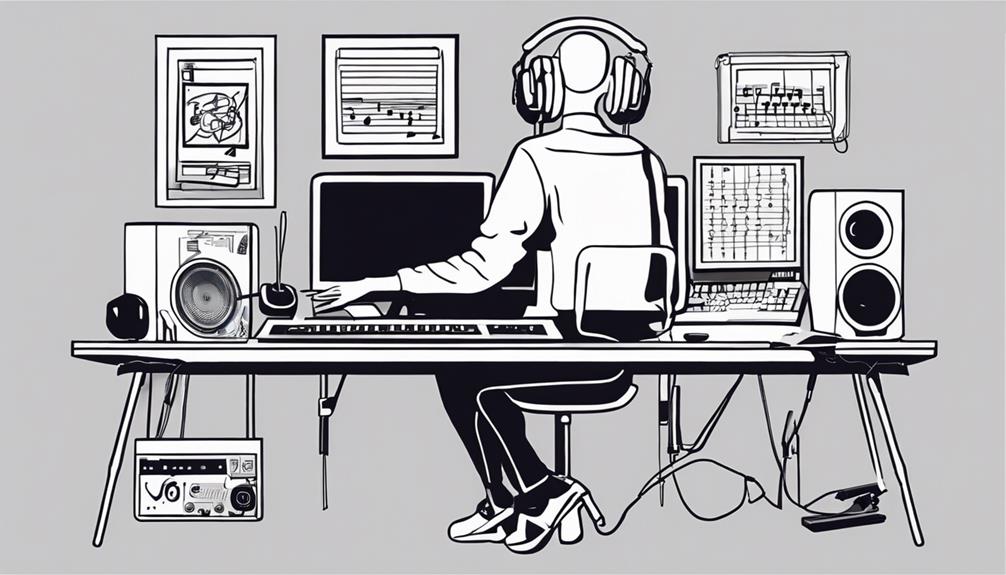
Developing a strong understanding of music theory is essential for aspiring music producers. This knowledge encompasses chord progressions, scales, and harmonies, providing the foundation for creating compelling music compositions.
Alongside music theory, technical proficiency in using digital audio workstations (DAWs) and recording equipment is critical in the music production process. Efficiently operating these tools allows producers to bring their creative visions to life.
Effective communication skills play an important role in collaborating with artists, songwriters, and other music industry professionals. Clear communication guarantees that everyone involved in a project is on the same page, leading to successful outcomes.
Additionally, creativity and innovation are key skills that enable music producers to craft unique and engaging soundscapes that captivate audiences.
Attention to detail and the ability to critically analyze and refine music compositions are also significant skills for music producers. These skills help producers fine-tune their work, ensuring a high level of quality and creativity in their music productions.
Steps to Kickstart Your Career
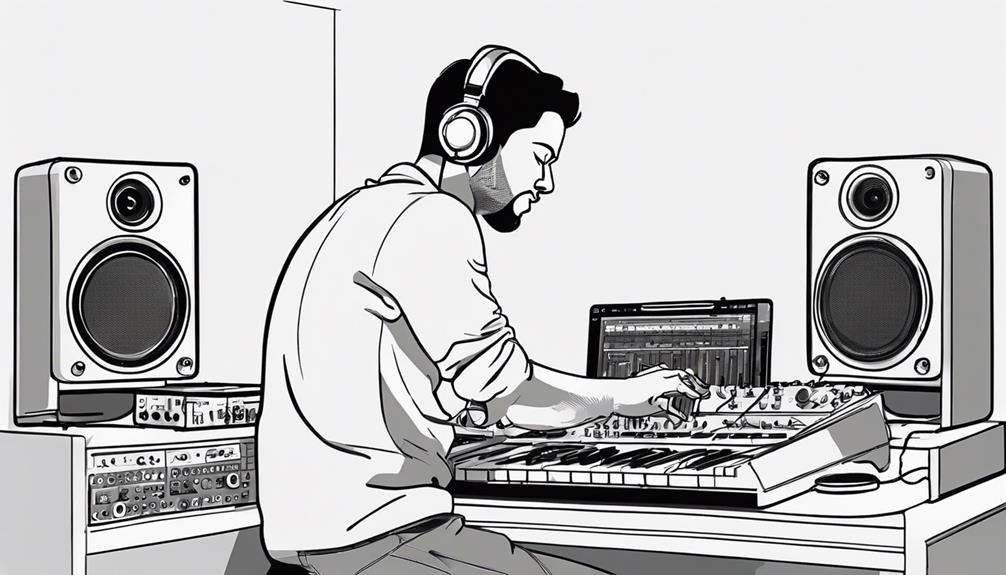
To kickstart your music production career, research and select music production software that aligns with your style and needs. This software will be your creative hub, enabling you to bring your musical ideas to life.
Invest in quality equipment like a reliable computer, audio interface, and studio headphones to set up your home studio. These tools are essential for producing high-quality music.
Consider taking online courses or workshops to enhance your music production skills and learn new techniques. Collaborating with aspiring musicians or vocalists can help you build your network and gain practical experience in the industry.
Utilize social media platforms to showcase your work and connect with potential clients or collaborators. Building a strong online presence can greatly boost your career prospects in music production.
Building a Home Studio Setup

When setting up your home studio, selecting essential gear like a computer, audio interface, studio monitors, and a microphone is vital.
Improving room acoustics with acoustic treatment can greatly enhance the sound quality in your studio.
Let's explore how these points can help you create a productive music production environment at home.
Essential Gear Selection
Selecting the right gear is essential when building your home studio setup for music production.
Start with key components like an audio interface to connect your instruments and microphones to your computer.
Invest in quality studio monitors to accurately hear the sounds you're creating and headphones for detailed mixing.
A MIDI controller can enhance your creativity by allowing hands-on control of virtual instruments and software.
Don't overlook the importance of acoustic treatment; consider adding diffusers, absorbers, and bass traps to optimize sound quality in your studio space.
Additionally, explore virtual instruments, plugins, and sample libraries to expand your sonic palette and discover new creative possibilities.
Room Acoustics Improvement
Enhance the sound quality of your home studio setup by strategically implementing acoustic treatment solutions such as bass traps and diffusers. Consider optimizing speaker placement and using isolation pads to reduce unwanted reflections and improve monitoring accuracy.
To enhance the overall sound in your home studio, invest in soundproofing materials like acoustic panels and foam to minimize external noise interference. For vocal recordings, a reflection filter or vocal booth can help improve the quality by reducing room reverberation.
Experimenting with room layout and furniture placement can also greatly impact the acoustics of your home studio. By strategically arranging items in the room, you can optimize sound diffusion and absorption, ultimately creating a more balanced and controlled listening environment.
Networking and Collaboration Tips
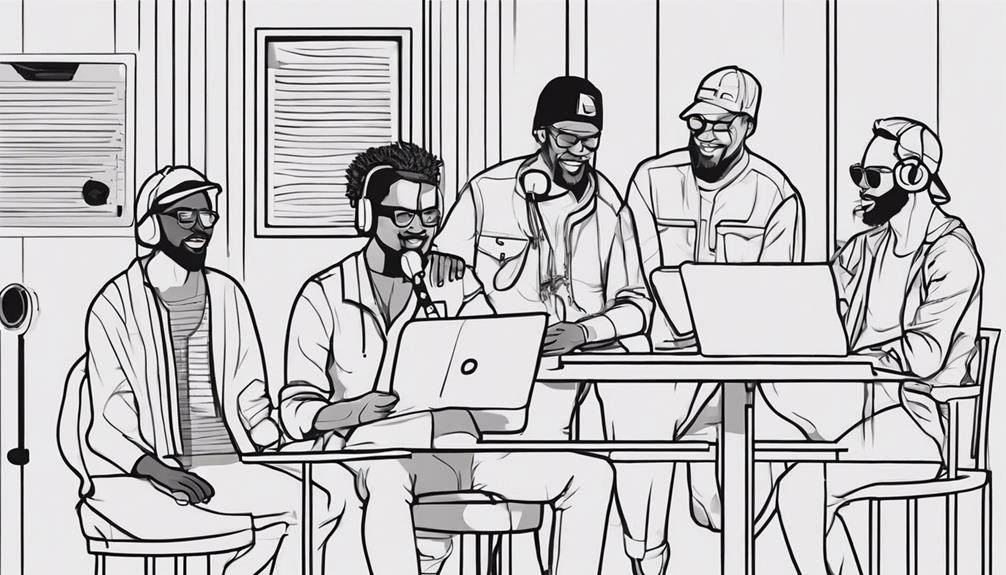
Expand your reach in the music production industry by actively engaging in collaborations with other professionals and artists. By networking and collaborating, you can gain exposure, learn new skills, and potentially open doors to exciting opportunities. Here are some tips to enhance your networking and collaboration efforts:
| Networking & Collaboration Tips | Description |
|---|---|
| Collaborate with other professionals | Work with music producers, artists, and vocalists to create unique and diverse projects. |
| Attend industry events | Participate in workshops, conferences, and events to meet industry professionals. |
| Connect with record labels | Initiate connections with labels and industry insiders to explore collaboration opportunities. |
| Share demos with A&R representatives | Seek feedback and potential deals by sharing your music demos with A&R representatives. |
| Join online music production communities | Engage with like-minded individuals on forums and social media to expand your network. |
Continuous Learning in Music Production
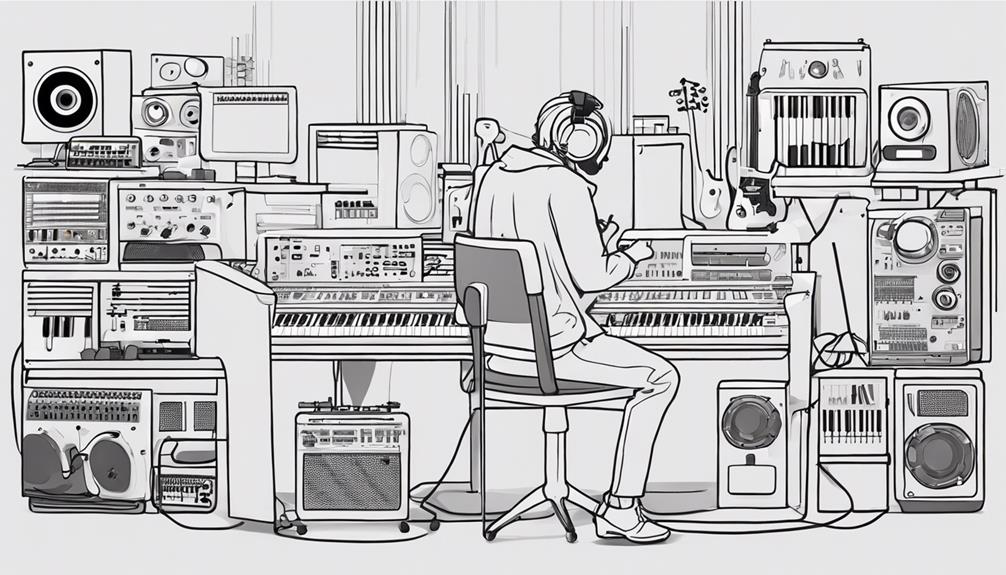
To excel in music production, you should continuously develop your skills and stay aware of industry trends.
Enroll in online courses, experiment with diverse genres, and practice regularly to refine your abilities.
Seeking mentorship and embracing challenges are key for your growth as a music producer.
Ongoing Skill Development
To continue advancing in music production, you must constantly seek opportunities for ongoing skill development and continuous learning. Enroll in advanced courses to enhance your technical skills and knowledge.
Regular practice is essential for refining your abilities and fostering creativity. Experimenting with various genres will help diversify your portfolio and expand your skill set.
Additionally, seeking mentorship from experienced professionals can provide valuable guidance and feedback for ongoing skill development. Stay updated on industry trends and software advancements through online resources and workshops to remain competitive in the field.
Industry Trends Awareness
Stay updated on current industry trends in music production by actively engaging with various online platforms and resources. Follow music production blogs, forums, and social media pages to stay informed about the latest developments.
Attend music production workshops, webinars, and conferences to learn about cutting-edge techniques and technologies shaping the industry. Join online communities and forums where you can discuss trends, share knowledge, and network with fellow music producers.
Additionally, keep an eye on industry publications and magazines to stay abreast of emerging trends, software updates, and production techniques that could enhance your skills.
Leveraging Digital Tools for Success
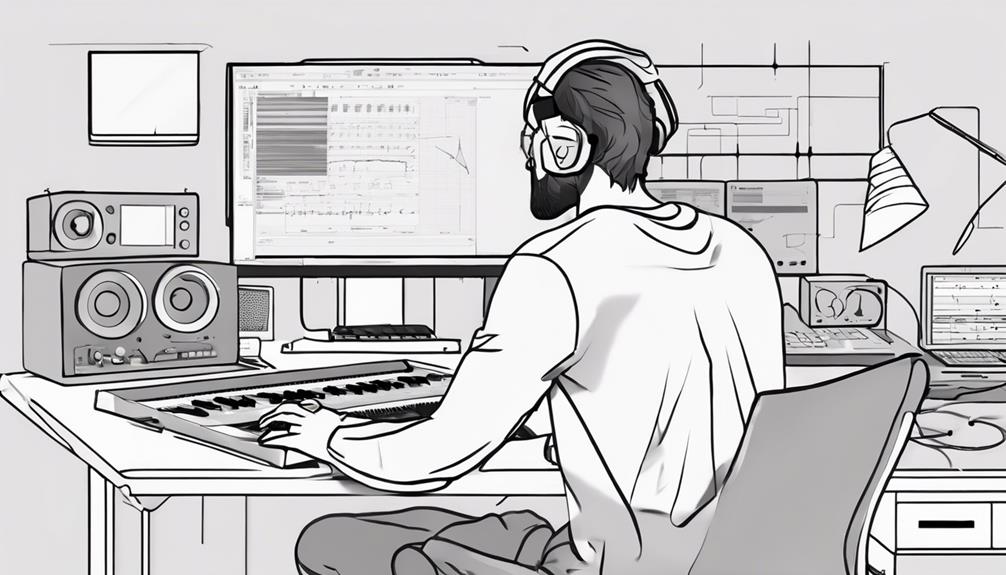
By harnessing the power of digital tools in music production, you can elevate your creative potential and enhance your success in the industry. Here's how leveraging digital tools can benefit aspiring producers:
- Versatile Platforms: Digital Audio Workstations (DAWs) provide a flexible platform for creating, recording, editing, and mixing music, allowing you to explore different styles and techniques effortlessly.
- User-Friendly Interfaces: Online DAWs like Soundtrap offer accessible interfaces, making it easy for newcomers to engage in music production without feeling overwhelmed by complex software.
- Remote Collaboration: Digital tools enable you to work with artists from around the globe, fostering collaboration and expanding your network without geographical limitations.
- Streamlined Creativity: Features such as pre-made loops, virtual instruments, and automation simplify the production process, boosting efficiency and sparking new creative ideas.
Embracing digital tools not only enhances your productivity but also empowers you to immerse yourself in the boundaries of your music production journey.
Frequently Asked Questions
How Do I Start a Music Production Career?
To start a music production career, learn music theory, master an instrument, and practice with digital audio workstations. Produce music, collaborate with artists, network, attend workshops, seek mentorship, take courses, and gain industry experience through internships or entry-level positions.
Can I Be a Music Producer With No Experience?
Yes, you can become a music producer with no experience. Engage actively, learn hands-on, utilize online resources, and network. Begin gradually, create a portfolio, collaborate, and seek mentorship. Dedication and practice will help you succeed.
Where to Start With Music Production?
Start with digital audio workstations like Ableton Live or Logic Pro. Learn through tutorials and courses. Get essential studio gear like a computer and audio interface. Practice creating music projects. Connect with other producers for guidance and opportunities.
How Do I Get My Music Career Started?
To kickstart your music career, immerse yourself in learning and creating. Build a strong portfolio, connect with fellow artists, and share your work online. Seek experience through internships and freelance gigs. Your journey is like planting seeds; nurture them to grow!
Conclusion
Now that you have the skills and knowledge to start your music production career, don't hesitate to immerse yourself and make your mark in the industry. Take advantage of every opportunity to collaborate with other artists, experiment with new sounds, and refine your craft. Getting started with music production can feel overwhelming at first, but persistence and passion will drive your growth. Remember, every successful producer began with small steps, so stay consistent and trust the process.
Remember, success in music production is a journey, not a destination. So keep learning, networking, and honing your craft.
With dedication and passion, you can turn your dream into reality and create music that moves the world. Embrace the challenges, embrace the process, and embrace your future in music production.
Let your creativity soar!


